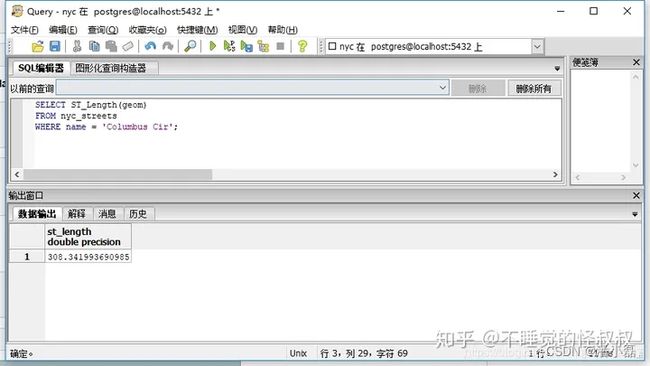PostGIS学习教程七:关于几何图形的练习
文章目录
- 一、函数列表
-
- 二、练习
一、函数列表
以下是我们迄今为止看到的所有函数的汇总,它们应该对练习有用!
sum(expression) aggregate to return a sum for a set of records
count(expression) aggregate to return the size of a set of records
ST_GeometryType(geometry) returns the type of the geometry
ST_NDims(geometry) returns the number of dimensions of the geometry
ST_SRID(geometry) returns the spatial reference identifier number of the geometry
ST_X(point) returns the X ordinate
ST_Y(point) returns the Y ordinate
ST_Length(linestring) returns the length of the linestring
ST_StartPoint(geometry) returns the first coordinate as a point
ST_EndPoint(geometry) returns the last coordinate as a point
ST_NPoints(geometry) returns the number of coordinates in the linestring
ST_Area(geometry) returns the area of the polygons
ST_NRings(geometry) returns the number of rings (usually 1, more if there are holes)
ST_ExteriorRing(polygon) returns the outer ring as a linestring
ST_InteriorRingN(polygon, integer) returns a specified interior ring as a linestring
ST_Perimeter(geometry) returns the length of all the rings
ST_NumGeometries(multi/geomcollection) returns the number of parts in the collection
ST_GeometryN(geometry, integer) returns the specified part of the collection
ST_GeomFromText(text) returns geometry
ST_AsText(geometry) returns WKT text
ST_AsEWKT(geometry) returns EWKT text
ST_GeomFromWKB(bytea) returns geometry
ST_AsBinary(geometry) returns WKB bytea
ST_AsEWKB(geometry) returns EWKB bytea
ST_GeomFromGML(text) returns geometry
ST_AsGML(geometry) returns GML text
ST_GeomFromKML(text) returns geometry
ST_AsKML(geometry) returns KML text
ST_AsGeoJSON(geometry) returns JSON text
ST_AsSVG(geometry) returns SVG text
还有请记住我们现在数据库中已经有的表:
nyc_census_blocks
–blkid, popn_total, boroname, geom
nyc_streets
–name, type, geom
nyc_subway_stations
–name, geom
nyc_neighborhoods
–name, boroname, geom
二、练习
①’West Village’社区(neighborhood)的面积是多少?
SELECT ST_Area(geom)
FROM nyc_neighborhoods
WHERE name = 'West Village';
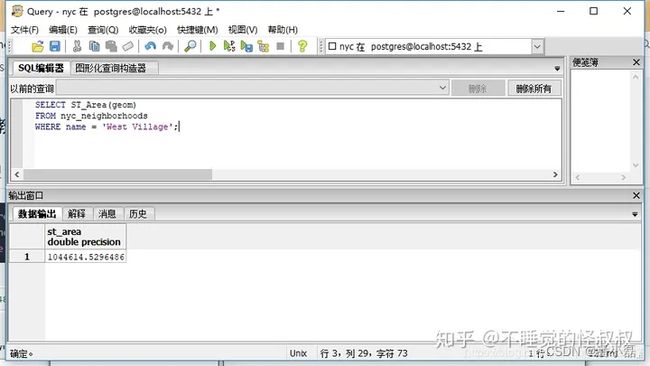
注意:面积以平方米为单位。要得到一个以公顷为单位的面积,需要再对其除以10000;要得到一个以英亩为单位的面积,需要对其除以4047。
②Manhattan(曼哈顿)行政区的面积是多少英亩?(提示:nyc_census_blocks和nyc_neighborhoods中都有boroname - borough name - 行政区名-这个字段)
SELECT Sum(ST_Area(geom)) / 4047
FROM nyc_neighborhoods
WHERE boroname = 'Manhattan';
SELECT Sum(ST_Area(geom)) / 4047
FROM nyc_census_blocks
WHERE boroname = 'Manhattan';
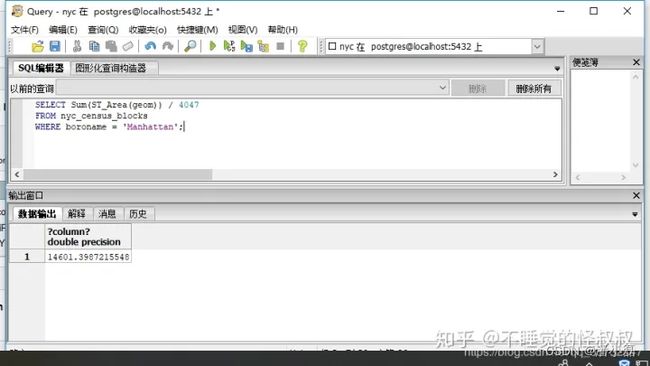
③纽约市(New York City)有多少个census blocks(人口普查块)多边形里有孔洞(内环)?
SELECT Count(*)
FROM nyc_census_blocks
WHERE ST_NumInteriorRings(ST_GeometryN(geom,1)) > 0;
注意:ST_NRings()函数可能让人感觉可以胜任,但是它会计算多-多边形的外环和内环。为了运行ST_NumInteriorRings(),我们需要将MultiPolygon几何图形转换为简单的多边形,因此,我们使用ST_GeometryN()从每个集合中提取第一个多边形。
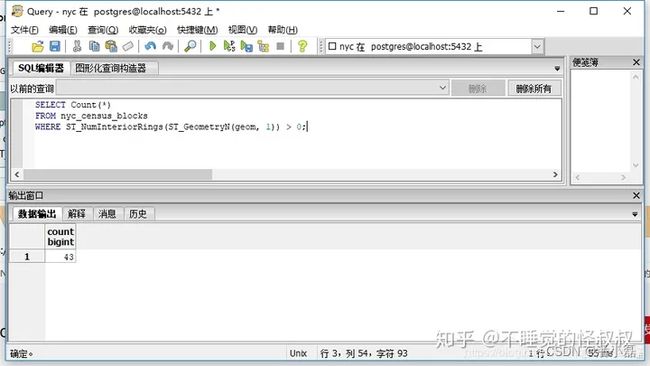
④纽约市(New York)的街道总长度是多少公里?(提示:空间数据的测量单位是米,每公里有1000米)
SELECT Sum(ST_Length(geom)) / 1000
FROM nyc_streets;
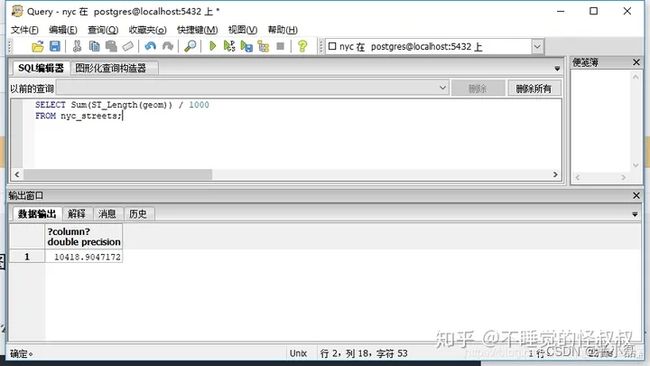
⑤’Columbus Cir’(哥伦布圆环——纽约曼哈顿区的一个地标)有多长?
SELECT ST_Length(geom)
FROM nyc_streets
WHERE name = 'Columbus Cir';
SELECT ST_AsGeoJSON(geom)
FROM nyc_neighborhoods
WHERE name = 'West Village';
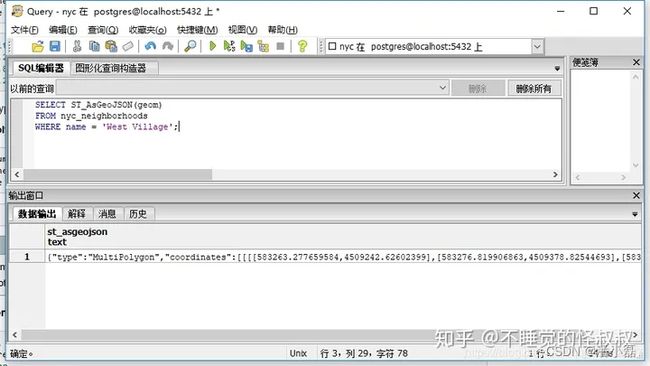
返回的JSON里的几何类型是"MultiPolygon(多多边形)",有趣!
⑦West Village社区的多多边形(MultiPolygon)中有多少个多边形?
SELECT ST_NumGeometries(geom)
FROM nyc_neighborhoods
WHERE name = 'West Village';
注意:在空间表中找到单元素多多边形并不少见。使用多多边形允许只有一种几何图形类型的表同时存储单(single-)几何图形和多(multi-)几何图形,而不必使用GeometryCollection类型。

⑧按类型(type)分组列出纽约市街道长度是多少?
SELECT type, Sum(ST_Length(geom)) AS length
FROM nyc_streets
GROUP BY type
ORDER BY length DESC;

